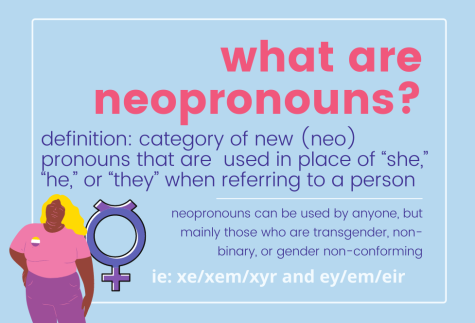The LGBTQ+ community has faced a lot of challenges throughout the last few decades. With the rise of social media and news coverage on such debates, the scrutiny has risen and caused even more problems across all generations. Younger people may face hate on social media platforms, but all the controversy has also caused older people to grow fearful of coming out.
One of the most prominent issues LGBTQ+ members are currently facing is the pronoun debate. With the rise in popularity of they/them pronouns and neopronouns, it has become quite the topic of discussion on social media platforms. Whether they are for or against the usage of any pronouns other than he/him and she/her, people are voicing their opinions.
Many of those who oppose the use of they/them pronouns cite the “fact” that such pronouns do not agree with basic English grammar rules. They say they/them are plural pronouns and cannot be used for a singular person, which is not true. In fact, APA has encouraged the use of “they” as a singular third-person pronoun.
Let’s think about a very common scenario. Say you find a coat on a chair and you ask “who left this?”, someone may respond “oh, it’s theirs,” and point to someone. They are referring to a single person but using a version of they/them to address them.
Now, look back at the previous sentence. I used the term “they” to refer to a singular person because I never specified their gender. And I just did it again. Just like they and them are used in everyone’s daily vocabulary, these pronouns are also used to refer to someone who is not gender-conforming, or non-binary.
See how easy it is to just use someone’s preferred pronouns? You use these terms a lot more often than you may realize. But the issue comes to light when you are being asked to use those pronouns.
There are a few viral videos of people asking others on their live streams what their pronouns are. In these videos, a lot of people have responded that they “don’t believe in pronouns” or “don’t use pronouns” or they just respond with their gender. It has become an opinion that pronouns are strictly attributed to those in the LGBTQ+ community. But that is completely false.
Everyone has pronouns. A cisgender female will go by she/her, and a cisgender male will go by he/him. Just because you are cisgender, that doesn’t mean you simply don’t have pronouns.

The other topic of debate surrounds neopronouns. Some examples of neopronouns are it/its, xe/xem, and ey/em. These pronouns may be hard to wrap your head around. Some say that they are just “made up,” but aren’t all pronouns and words made up? Just because something is untraditional and new to you, doesn’t mean it isn’t valid.
I have seen that a lot of people don’t particularly have an issue with the examples of neopronouns I gave above, but the more controversial ones are the ones that are based on other objects. I have seen on social media that someone uses bun/bunself, and that is very far from being traditional. Not saying it isn’t a valid preference, but it can be a lot to understand and learn how to use.
It can be difficult to wrap your head around sometimes, with the ever-changing gender terms and pronouns, but if you put a little bit of thought into it, it may make someone’s day. I have used the gender-neutral pronouns they and them a lot throughout this piece because I have not stated someone’s gender. It really isn’t that hard, and no it doesn’t go against grammar.
Just take the time to try and understand others. Take the time to learn that you do, in fact, have pronouns. If someone looks like a girl, that doesn’t mean they want to go by she/her. And if you do make the mistake of using the wrong pronouns for someone, just be kind if they correct you and work on doing better next time.
It is unfortunate when someone gets mad at you for using the wrong pronouns, it should be okay if you make a mistake when you don’t know what they prefer. But, do not blatantly use the wrong pronouns for someone because it makes you uncomfortable. You would be mad if you used he/him and someone purposely referred to you as she/her. Why is it so different when it comes to other people?

















